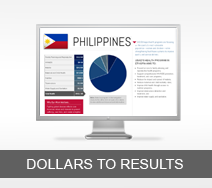Philippines Country Profile [PDF] ![]() (pdf - 252k)
(pdf - 252k)
The Philippines has emerged as one of the fastest growing economies in the region, with gross domestic product growth averaging six percent between 2010 and 2016. Poverty has also declined, dropping from 26.3 percent in 2009 to 21.6 percent in 2015. USAID partners with the Government of the Philippines to address the country's greatest development challenges by reducing high rates of maternal and neonatal mortality and tuberculosis, improving access to quality education and helping communities prepare for and respond to disasters.
USAID's work accelerates and sustains inclusive growth to support a more prosperous, stable and well-governed nation, fosters peace and stability in conflict-affected areas of Mindanao, and enhances the country’s environmental resilience to climate change, natural disasters and threats to biodiversity.
ECONOMIC DEVELOPMENT, GOVERNANCE, HEALTH AND EDUCATION
Through the Partnership for Growth, USAID—in collaboration with six other U.S. Government agencies and the Philippine Government—addresses the country's most binding constraints to inclusive and sustainable growth. USAID fosters economic development by strengthening public revenue generation and expenditure management, improving the effectiveness of the judiciary system and supporting initiatives to curb corruption. We help create jobs by streamlining business licensing and shepherding public-private partnerships that promote innovation and drive infrastructure development. Through our Cities Development Initiative, USAID collaborates with partner cities outside Metro Manila to fulfill their potential as engines of inclusive economic growth. We also strengthen health systems in 58 cities and provinces, home to 77 percent of the population. We help improve early-grade reading skills for over one million children and equip university students with skills to meet industry demands.
PEACE AND STABILITY IN MINDANAO
Since the 1990s, USAID has promoted peace and stability in Mindanao. Following significant progress, USAID now focuses on six conflict-affected areas, collaborating with local governments and civil society to improve governance, economic growth, health, education, water and natural resource management. Our assistance supports local governments’ delivery of social and economic services and bolsters citizen engagement–especially among youth–in the process.
ENVIRONMENTAL RESILIENCE
One of the world's most disaster-prone countries, the Philippines loses up to $5 billion every year due to natural disasters. The U.S. and the Philippines partner to enhance the country's environmental resilience and mitigate the impacts of natural disasters. For long-term resilience, USAID works with the Philippine Government to improve natural resource management, reduce disaster risks and integrate low-emission development strategies in local planning.








![Philippines Country Profile [PDF] Philippines Country Profile [PDF]](https://2012-2017.usaid.gov/sites/default/files/Philippines_Country_Profile_Page_1_1.jpg)

Comment
Make a general inquiry or suggest an improvement.